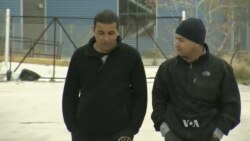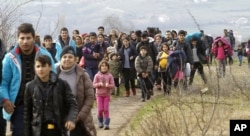Among the tens of thousands of refugees stranded in Greece are many Afghan nationals. VOA spoke to several of them who claim they were forced to flee threats from the Taliban because they had worked with U.S. and coalition forces.
Among them are Mohammed and Yusuf, who say they feel abandoned by the United States. We’ve changed their names to protect family members back home.
Until last year, the former medical students worked in a hospital run by South Korean forces at the U.S. Air Base at Bagram in Afghanistan.
They lost their jobs after the South Koreans withdrew from the country.
“I went to Bagram airfield for six years. I was just covering my face you know, going from home and going back covering my face, so the people don’t know where I am working,” said Mohammed.
Mohammed and Yusuf applied for Special Immigrant Visas or SIVs, a program set up to help Afghan and Iraqi nationals who worked with U.S. forces to gain asylum in the United States. VOA has seen their documentation.
“At the end they told me that you are not eligible for this visa,” Mohammed told VOA. “Then I asked why, they said because we have been working with South Korean people. But the South Korean hospital was located in Bagram airfield. Bagram airfield is U.S. property.”
Then they asked the Seoul government for help, but were told that South Korea has no asylum procedures.
After receiving threats from the Taliban, they fled to Europe, with Mohammed’s 16-year-old son.
They now live in a makeshift refugee camp at the former Olympic Park in Athens. Their bed is a concrete floor; they don’t even have a tent.
“There is no hygiene, the situation is very bad. And I am Physician’s Assistant and Medical Interpreter. But why I am here, what should I do here?” asked Mohammed.
In an emailed statement, a U.S. State Department official told VOA that amendments had been made "to include certain Afghans who were employed by the International Security Assistance Force." The official added that, "improving the processing time remains an area of focus both here in Washington and at our embassy in Kabul."
Mohammed’s decision is on appeal, but he has been given no time frame.
Benjamin Hill, a retired U.S. Army physician and one of several former servicemen who provided Mohammed with a reference for his visa application, told VOA that he is dismayed by his former colleague’s situation.
“I really have very little concern that he would be a threat of any kind to the United States, just by the character that he presented. And of course the level of competency he brings in relative to his skill as well as his language abilities again can only do positive things for the receiving nation,” said Hill.
VOA spoke to several other Afghan refugees in Greece who said they were awaiting decisions on SIV applications.
The U.S. government says it has issued more than 20,000 visas to Afghan nationals since October 2014. For Mohammed and Yusuf, the wait goes on.






